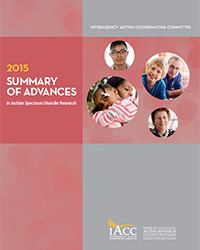Summary of Advances
In Autism Spectrum Disorder Research
2015
Effect of parent training vs parent education on behavioral problems in children with autism spectrum disorder: a randomized clinical trial
Bearss K, Johnson C, Smith T, Lecavalier L, Swiezy N, Aman M, McAdam DB, Butter E, Stillitano C, Minshawi N, Sukhodolsky DG, Mruzek DW, Turner K, Neal T, Hallett V, Mulick JA, Green B, Handen B, Deng Y, Dziura J, Scahill L. JAMA. 2015 Apr 21;313(15):1524-33. [PMID: 25898050]
Children with autism often exhibit disruptive behavior (e.g. tantrums, aggression, self-injury), which can interfere with the children’s daily functioning, while also posing a challenge for parents and caregivers. Although parent training is an intervention that shows promise for treating these behaviors, a large-scale clinical trial approach had not previously been undertaken to evaluate parent training for the treatment of children with ASD. In this study, the researchers designed the first large-scale randomized trial to assess the efficacy of parent training compared with a parent education-based intervention to address disruptive behavioral problems in children with ASD. Parent training intervention provides parents with specific strategies for managing disruptive behavior, while parent education provides parents with information about autism, but does not include behavior management strategies. Six research centers participated in the study; 180 children aged 3 to 7 years with ASD and disruptive behaviors were selected in a screening process and randomly assigned to the parental training versus parental education intervention groups.
Parental training (done individually) and education were carried out over 24 weeks through center and home visits, as well as through telephone conferences for parent training. At various times during the 24 weeks and for another 24 weeks afterwards, parents rated their child’s disruptive behavior and noncompliance using specific scales and questionnaires. In addition, clinicians unaware of the group category of each child also rated the children’s behaviors to assess the outcomes. While both treatments led to improvements in disruptive behavior as measured by both parent-reported outcomes and blinded clinician ratings, the analyses showed that parent training produced better outcomes than parent education. The difference in improvements between the two groups did not meet the level of clinical significance that the research team had anticipated, but the authors still consider the difference noteworthy. Prior to conducting the study, the researchers had expected parent training to be much more effective than parent education; they suggest that the smaller-than-expected difference observed in this study may be due to a higher-than-predicted level of improvement produced by parent education. Future analyses are required to examine and identify which child and family characteristics may predict success with either the parent training or the parent education approaches. Another factor that may be useful to investigate in the future is the cost effectiveness of each type of intervention. In addition, because the researchers involved in this study were well trained and because there was a low dropout rate among study participants, the authors propose that further study is also needed to evaluate results of these interventions in settings with less-skilled clinicians and/or lower levels of parental cooperation.




